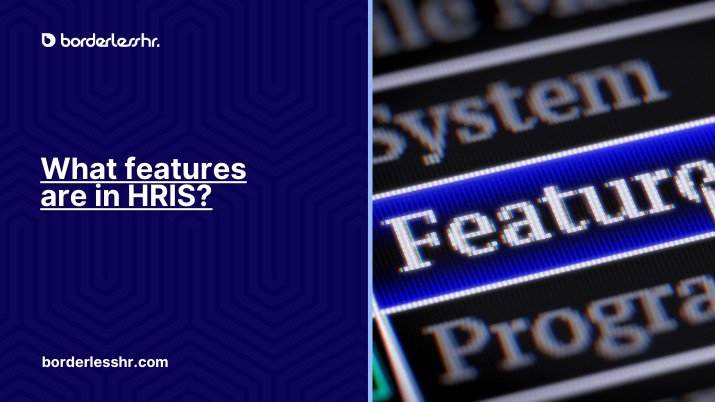Human Resource Information Systems (HRIS) have become indispensable tools for modern organizations, streamlining various HR processes and significantly improving efficiency. HRIS capabilities include various features designed to handle tasks such as employee management, payroll, recruitment, training, and analytics.
Understanding HRIS capabilities is essential for businesses aiming to optimize their HR operations and maximize employee productivity. In this article, we will delve into the fundamental features of HRIS and their significance in enhancing human resource management.
HRIS Capabilities and Features
Employee Database Management
Every HRIS’s core is its ability to efficiently manage employee data. This includes storing and updating personal details, contact information, employment history, performance reviews, and disciplinary records.
A centralized database ensures easy access to vital information, facilitating seamless communication between HR personnel and employees. Additionally, advanced HRIS systems offer customizable fields to accommodate specific organizational needs, ensuring the flexibility to adapt to evolving requirements.
Payroll Management
HRIS simplifies payroll processing by automating calculations, tax deductions, and direct deposits. These systems can generate pay stubs, track overtime, and handle deductions for benefits and taxes accurately.
By integrating with financial systems, HRIS ensures compliance with regulatory requirements and minimizes errors in payroll processing, thereby enhancing employee satisfaction and reducing administrative burdens on HR departments.
Time and Attendance Tracking
Efficient time and attendance tracking is essential for monitoring employee productivity and ensuring compliance with labor regulations. HRIS offers features such as digital timesheets, biometric attendance systems, and geolocation tracking to record employee hours accurately.
Automated notifications for tardiness or absences enable prompt intervention, while comprehensive reporting tools provide insights into attendance patterns, facilitating better workforce management decisions.
Recruitment and Applicant Tracking
HRIS streamlines the recruitment process by automating job posting, resume screening, and candidate communication tasks. Applicant tracking features enable HR professionals to manage candidate pipelines efficiently, from initial application to onboarding.
Integration with career websites and social media platforms expands the reach of job postings, attracting top talent while reducing time-to-hire. Moreover, analytics tools provide valuable insights into recruitment metrics, enabling organizations to refine their hiring strategies for better outcomes.
Training and Development
Investing in employee training and development is crucial for fostering skill enhancement and career progression. HRIS facilitates the creation and management of training programs, including scheduling sessions, tracking attendance, and assessing learning outcomes.
E-learning modules and self-paced courses cater to diverse learning styles, while automated reminders ensure employees stay engaged with their training goals. By aligning training initiatives with organizational objectives, HRIS helps nurture a skilled and motivated workforce capable of driving business growth.
Performance Management
Effective performance management is essential for evaluating employee contributions, providing feedback, and aligning individual goals with organizational objectives. HRIS offers features for setting performance goals, conducting regular reviews, and documenting feedback. Performance appraisal workflows streamline the evaluation process, ensuring transparency and fairness.
Additionally, performance analytics provide valuable insights into employee performance trends, facilitating informed decision-making regarding promotions, compensation adjustments, and talent development initiatives.
Employee Self-Service Portals
Empowering employees with self-service capabilities enhances their engagement and satisfaction while reducing administrative overhead for HR departments. HRIS provides self-service portals where employees can access their personal information, submit time-off requests, view pay stubs, and enroll in benefits programs.
By enabling employees to manage routine tasks independently, HRIS fosters a culture of autonomy and accountability while freeing up HR resources to focus on strategic initiatives.
Compliance Management
Ensuring compliance with labor laws, industry regulations, and internal policies is paramount for organizations across various sectors. HRIS features dedicated compliance modules that help track regulatory changes, manage documentation, and automate compliance reporting.
By centralizing compliance efforts and generating audit trails, HRIS minimizes the risk of non-compliance penalties and legal liabilities, safeguarding the organization’s reputation and financial well-being.
Analytics and Reporting
Data-driven decision-making is essential for optimizing HR strategies and driving business performance. HRIS offers robust analytics and reporting capabilities, allowing HR professionals to analyze key metrics such as turnover rates, employee engagement scores, and training effectiveness.
Customizable dashboards and visualizations facilitate the interpretation of data, enabling stakeholders to identify trends, pinpoint areas for improvement, and measure the impact of HR initiatives on organizational outcomes.
Security and Data Privacy
Protecting sensitive employee information is paramount for HRIS vendors and organizations alike. These systems incorporate robust security measures such as data encryption, access controls, and authentication protocols to safeguard against unauthorized access and data breaches.
Compliance with data privacy regulations such as GDPR and CCPA ensures that employee data is handled ethically and transparently, fostering trust and confidence among employees and stakeholders.
Succession Planning and Talent Management
HRIS often includes modules for succession planning and talent management, allowing organizations to identify and develop high-potential employees for future leadership roles.
These features facilitate talent reviews, competency assessments, and career path planning, ensuring a robust pipeline of qualified candidates to fill key positions. By proactively managing succession, organizations reduce the risk of leadership gaps and foster continuity in leadership transitions.
Employee Self-Service Portals
Employee self-service portals are integral components of HRIS, empowering employees to access and manage their personal information, benefits, and employment-related tasks autonomously.
Through self-service portals, employees can update their contact details, view pay stubs, request time off, and enroll in training programs, reducing administrative burden on HR staff and enhancing employee engagement and satisfaction.
Workflow Automation and Integration
HRIS platforms leverage workflow automation to streamline HR processes and eliminate manual tasks. Integration with other business systems such as Enterprise Resource Planning (ERP) and Customer Relationship Management (CRM) systems enables seamless data exchange and process alignment across departments.
Automated workflows enhance efficiency, reduce errors, and ensure consistency in HR operations, contributing to overall organizational productivity.
Employee Engagement Surveys and Feedback Mechanisms
Employee engagement is a key driver of organizational performance and retention. HRIS often includes features for conducting employee engagement surveys, gathering feedback, and measuring employee satisfaction levels.
These tools enable HR departments to identify areas for improvement, address employee concerns, and implement initiatives to enhance workplace culture and morale, ultimately fostering a more engaged and productive workforce.
Workforce Planning and Forecasting
HRIS platforms provide organizations with insights into their workforce demographics, skills inventory, and future staffing needs, facilitating workforce planning and forecasting.
Through workforce analytics and predictive modeling, HR professionals can anticipate talent gaps, succession needs, and recruitment requirements, enabling proactive talent management strategies and alignment with business objectives.
Mobile Accessibility and Remote Work Support
With the rise of remote work and distributed teams, HRIS vendors are increasingly offering mobile-friendly applications and remote access capabilities. Mobile accessibility enables employees to access HRIS functionalities from anywhere, anytime, using their smartphones or tablets.
Remote work support features such as virtual collaboration tools, remote onboarding modules, and flexible scheduling options accommodate diverse work arrangements and enhance employee productivity and satisfaction.
Employee Wellness and Benefits Programs
HRIS platforms support employee wellness initiatives by facilitating the administration of wellness programs, health screenings, and employee assistance programs (EAPs).
These systems track employee participation, monitor health metrics, and provide resources for promoting physical and mental well-being. Integration with wellness platforms and benefits providers enhances the effectiveness of wellness initiatives and fosters a culture of employee well-being within the organization.
Global HR and Multi-Language Support
For multinational organizations, HRIS platforms offer features tailored to manage global HR operations, including multi-language support, multi-currency capabilities, and compliance with international labor laws and regulations.
These systems accommodate diverse workforce demographics and enable seamless communication and collaboration across geographies, ensuring consistency in HR practices and policies on a global scale.
Employee Recognition and Rewards Programs
Recognizing and rewarding employee contributions is essential for fostering motivation, engagement, and loyalty. HRIS platforms include features for implementing employee recognition programs, peer-to-peer recognition tools, and rewards management systems.
These programs acknowledge outstanding performance, celebrate achievements, and reinforce desired behaviors, contributing to a positive work culture and employee retention.
Predictive Analytics and Artificial Intelligence (AI)
Advanced HRIS solutions leverage predictive analytics and AI algorithms to forecast workforce trends, identify patterns, and make data-driven predictions.
Predictive analytics enable HR professionals to anticipate turnover risks, talent shortages, and skill gaps, allowing proactive interventions and strategic workforce planning.
AI-powered tools automate routine tasks, personalize employee experiences, and enhance decision-making capabilities, driving efficiency and innovation in HR management.
Conclusion
In today’s business environment, leveraging HRIS features is essential for organizations seeking to streamline HR operations, enhance employee engagement, and drive organizational success. From employee database management to analytics and compliance management, the comprehensive functionalities of HRIS empower HR departments to perform their roles efficiently while supporting strategic decision-making across the organization.
By embracing these features and harnessing the power of technology, businesses can build a resilient workforce capable of adapting to evolving challenges and seizing growth opportunities.







